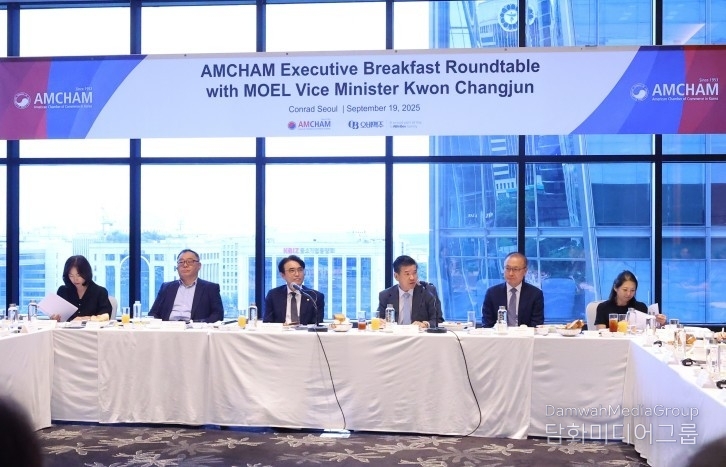By Diplomacy Journal Lee Kap-soo
The American Chamber of Commerce in Korea (AMCHAM) hosted the inaugural session of its new Executive Roundtable Series on Sept. 19 at the Conrad Seoul Hotel.
The closed-door breakfast discussion brought together senior executives of multinational and Korean companies with Kwon Chang-jun, Vice Minister of Employment and Labor, to discuss the new administration’s labor policy direction and priorities for Korea’s economic renewal.

Vice Minister Kwon shared the government’s policy agenda under the vision of “real growth with labor” and the goal of building a “labor-respecting society where everyone can work happily.” He outlined three key priorities: protecting the rights of all workers, narrowing gaps to promote fairness in the workplace, and invigorating the labor market.
He also highlighted recently announced initiatives including measures to eradicate wage arrears (Sept. 2), the Youth Job First-Step Guarantee program (Sept. 10), and the Comprehensive Occupational Safety Plan (Sept. 15).
The Vice Minister further discussed upcoming policy directions such as reducing serious workplace accidents, government support for the potential adoption of a 4.5-day workweek, and a mutually beneficial approach to retirement age extension, while engaging in open dialogue and listening to feedback from the business community.
AMCHAM Chairman & CEO James Kim said, “This new roundtable series provides a forward-looking platform for constructive dialogue between the Korean government and the global business community. To strengthen Korea’s position as a true regional hub, improving the overall business environment is essential - and labor flexibility lies at the heart of that effort.”
He added, “With fewer than 100 regional headquarters compared to 5,000 in Singapore and 1,400 in Hong Kong, Korea has a golden opportunity over the next five years to close this gap. AMCHAM stands ready to work closely with the government to shape meaningful labor reforms that will enhance Korea’s competitiveness and role as Asia’s premier business hub. With the recent passage of the Yellow Envelope Act, the Ministry’s Task Force will play a crucial role in ensuring that industry feedback is fully reflected. To support this process, AMCHAM is conducting a member survey and will be sharing concrete policy recommendations in the coming weeks.”
Participants raised key concerns, including: frequent changes in labor laws and regulations that undermine predictability; the potential weakening of management rights and limited recourse in addressing prolonged illegal strikes under the Yellow Envelope Act; legal restrictions on deploying substitute labor during strikes; supply chain disruptions caused by illegal work stoppages in the logistics sector; and the need to improve the Serious Accidents Punishment Act to focus more on prevention.
They also emphasized the importance of strengthening dispute resolution and arbitration mechanisms and called for institutional improvements to ensure that both foreign-invested and Korean companies can operate in a stable and predictable environment.







